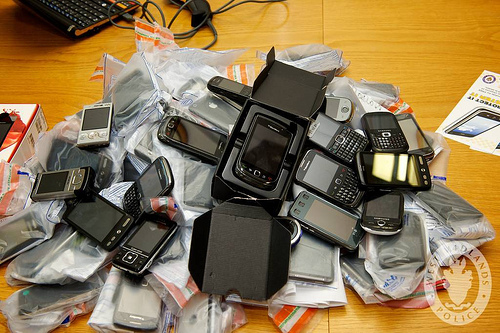Imagine losing the ability to stay connected to friends, family and co-workers; to check personal and work email; do online banking; or participate in social networks. In today’s ever-increasing mobile market, when you lose your smartphone, it can feel like your world is lost, too. For pickpockets or thieves, it doesn’t matter how personal that mini-computer that can cost up to $800 retail is to you — it’s simply profit to them.
Some cities are especially well-known for smartphone theft, such as Philadelphia, where 39 phones are lost and/or stolen through SEPTA, its mass transit system, a month. ABC News also reports 33 percent of reported robberies are for cell phones. Avoid the painful process of going through identity theft from cell phone loss or theft by protecting yourself before the crime occurs.

Credits: Photo of lost and stolen phones by Flickr user West Midlands Police
Be Vigilant
Don’t become absorbed in your smartphone when you’re out and about, especially if you’re going to be traveling near areas known for higher crime rates. Protect yourself and your possessions by appearing to be a less desirable robbery target. Don’t be on your phone when you’re leaving public transportation stations, or text while walking down the street at night.
Avoid passing over physical possession of your phone in public, or letting someone use it when he gives you a sob story about needing to borrow your phone. That’s an easy way to have someone take off with it. Keep your smartphone in a briefcase or purse instead of your pockets, so you have less of a chance of it falling out as you go about your day-to-day business.
App Protection
Sometimes, your best efforts aren’t enough to stop someone from taking off with your phone. You still have options that will help you get your phone back and prevent identity theft. Anti-theft apps such as BullGuard Mobile Security 10 allow you to remotely access your smartphone, so you can lock it down, transfer the data, or factory reset the phone when it’s stolen. Remote wiping is a standard feature on most anti-theft apps on the market. If you have a front-facing phone, get an app that takes a picture any time the thief tries to unlock your phone and uploads the photo to a cloud service. That way, you know what your thief looks like, helping police track them down. The GPS on your phone will give you an approximate location, as well.
To cut down on identity theft, LifeLock recommends against storing passwords and other sensitive data directly on the phone. You can also put lock screens on each individual app, making it difficult for a data thief to get into each app and pull out your information. He may get so frustrated, he would rather wipe the phone and sell it, instead of attempting to get your bank account information or other data that would allow him to open up credit cards and accounts.
Author Bio : Jamie Mcdonald, Jamie is a tech freelance writer whose best friend is her smartphone and library of mobile apps.

